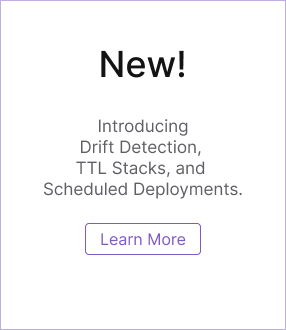Pulumi ESC Syntax Reference
# ---------------------------------------------------------------------------------------
# Imports section names the environments to import. Environments are merged in order
# per JSON merge patch.
# ---------------------------------------------------------------------------------------
# imports is an optional top-level key
imports:
- environment-a
- environment-b
# ---------------------------------------------------------------------------------------
# Main configuration -- set configuration values either as static values, or interpolated
# from other sources. Values are merged onto imported environments per JSON merge patch.
# ---------------------------------------------------------------------------------------
# values is a required top-level key
values:
# Values can be objects, arrays, strings, numbers, or booleans
# References to this value will use the path excluding the
# top-level "values" key
# Path is "app"
app:
# Path is "app.setting"
setting: example
# Path is "app.replicas"
replicas: 3
# Path is "app.enabled"
enabled: true
# Path is "app.nested"
nested:
# Path is "app.nested.setting"
setting: nested-example
# Path is "app.items"
# Array elements are "app.items[0]" and "app.items[1]"
items: [ "config-a", "config-b" ]
# Values within the environment and its imports may be referenced
# Path is "app.settingCopy"
settingCopy: ${app.setting}
# Values can interpolate contextual information
rootEnvName: ${context.rootEnvironment.name}
currentEnvName: ${context.currentEnvironment.name}
currentUser: ${context.pulumi.user.login}
currentOrg: ${context.organization.login}
# ---------------------------------------------------------------------------------------
# Functions -- configuration may be transformed with the following functions
# ---------------------------------------------------------------------------------------
# Scalar values may be marked secret. The value will be encrypted and
# stored as ciphertext when the environment is saved.
# Path is "app.password"
password:
fn::secret: YQ!r24kdF7
# Join array elements with the given delimiter
# Path is "app.url"
url:
fn::join: [ ", ", "${app.items}" ]
# Encode the argument as a Base64 string
# Path is "app.passwordB64"
passwordB64:
fn::toBase64: ${app.password}
# Decodes a base64-encoded string
# Path is "app.plainString"
plainString:
fn::fromBase64: ${app.passwordB64}
# Encode the argument as a JSON string
# Path is "app.jsonConfig"
jsonConfig:
fn::toJSON: ${app.nested}
# Decode the JSON string as a JSON Object
# Path is "app.jsonConfigObject"
jsonConfigObject:
fn::fromJSON: ${app.jsonConfig}
# Encode the argument as a string
# Path is "app.strConfig"
strConfig:
fn::toString: ${app.nested}
# ---------------------------------------------------------------------------------------
# Dynamic configuration from providers -- configuration may be loaded from external
# sources using a variety of providers. This configuration will be loaded when the
# environment is opened.
# ---------------------------------------------------------------------------------------
# 1Password Provider examples
1password:
secrets:
fn::open::1password-secrets:
login:
serviceAccountToken:
fn::secret: "ops_123ABC"
get:
email_section_example:
ref: "op://Management/PagerDuty/Admin/email"
anna_sans_section_example:
ref: "op://dev/Stripe/publishable-key"
olaf_attr_example:
ref: "op://development/GitHub/Security/one-time password?attribute=otp"
sven_ssh_example:
ref: "op://Private/ssh keys/ssh key/private key?ssh-format=openssh"
nokk_whitespace_example:
ref: "op://development/aws/Access Keys/access_key_id"
gale_unique_id_example:
ref: "op://prod/yj3jfj2vzsbiwqabprflnl27lm/password"
# AWS Provider examples
aws:
login:
fn::open::aws-login:
oidc:
roleArn: arn:aws:iam::086028354146:role/pulumi-deployments-oidc
sessionName: pulumi-environments-session
secrets:
fn::open::aws-secrets:
region: us-west-1
login: ${aws.login}
get:
api-key:
secretId: api-key
app-secret:
secretId: app-secret
# Azure Provider examples
azure:
login:
fn::open::azure-login:
clientId: aaaaaaaa-bbbb-cccc-dddd-eeeeeeeeeeee
tenantId: aaaaaaaa-bbbb-cccc-dddd-eeeeeeeeeeee
subscriptionId: /subscriptions/00000000-0000-0000-0000-000000000000
oidc: true
secrets:
fn::open::azure-secrets:
login: ${azure.login}
vault: example-vault-name
get:
api-key:
name: api-key
app-secret:
name: app-secret
# GCP Provider examples
gcp:
login:
fn::open::gcp-login:
project: 123456789
oidc:
workloadPoolId: pulumi-esc
providerId: pulumi-esc
serviceAccount: pulumi-esc@foo-bar-123456.iam.gserviceaccount.com
secrets:
fn::open::gcp-secrets:
login: ${gcp.login}
access:
api-key:
name: api-key
app-secret:
name: app-secret
# Vault Provider examples
vault:
login:
fn::open::vault-login:
address: https://127.0.0.1:8200/
jwt:
role: example-role
namespace: example # namespace is only supported for Vault Enterprise
secrets:
fn::open::vault-secrets:
login: ${vault.login}
read:
api-key:
path: api-key
app-secret:
path: app-secret
field: app-field
# Pulumi Stacks Provider example
app:
fn::open::pulumi-stacks:
stacks:
k8-cluster:
stack: k8-cluster-1/dev
kubeconfig:
fn::toJSON: ${app.k8-cluster.kubeconfig}
# ---------------------------------------------------------------------------------------
# Exports -- expose configuration values to particular consumers
# ---------------------------------------------------------------------------------------
# Configuration nested under the "environmentVariables" key is used to export environment
# variables when using `esc open --shell`, `esc run`, or `pulumi up/preview/refresh/destroy`
environmentVariables:
AWS_ACCESS_KEY_ID: ${aws.login.accessKeyId}
AWS_SECRET_ACCESS_KEY: ${aws.login.secretAccessKey}
AWS_SESSION_TOKEN: ${aws.login.sessionToken}
# Configuration nested under the "pulumiConfig" key will be available to Pulumi stacks that
# reference this environment during `pulumi up/preview/refresh/destroy`
pulumiConfig:
aws:region: us-west-2
# Configuration nested under the 'files' key is used to export as files to the environment
# when using 'esc open --shell', 'esc run', or `pulumi up/preview/refresh/destroy`
files:
KUBECONFIG: ${kubeconfig}
Thank you for your feedback!
If you have a question about how to use Pulumi, reach out in Community Slack.
Open an issue on GitHub to report a problem or suggest an improvement.
